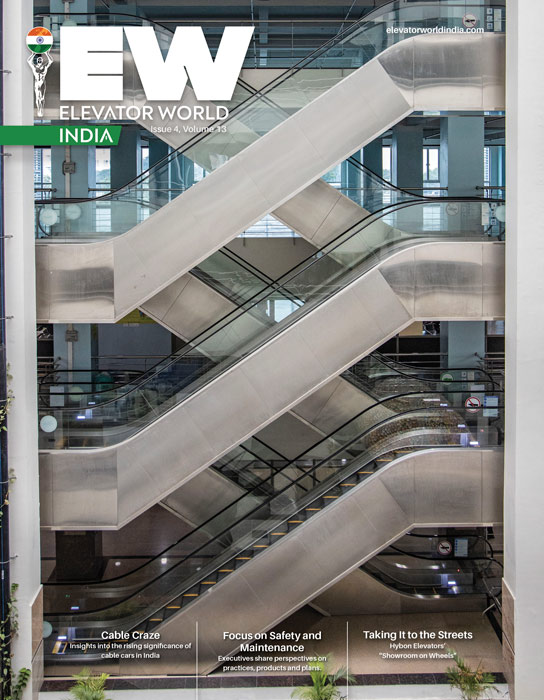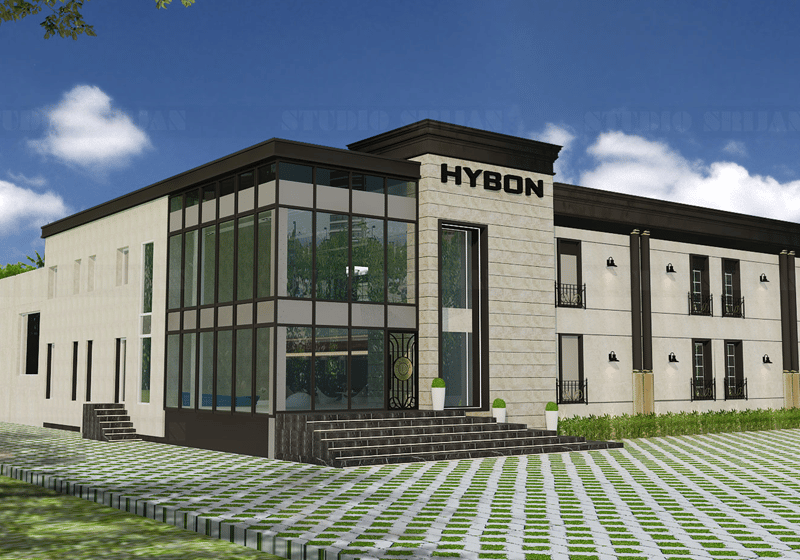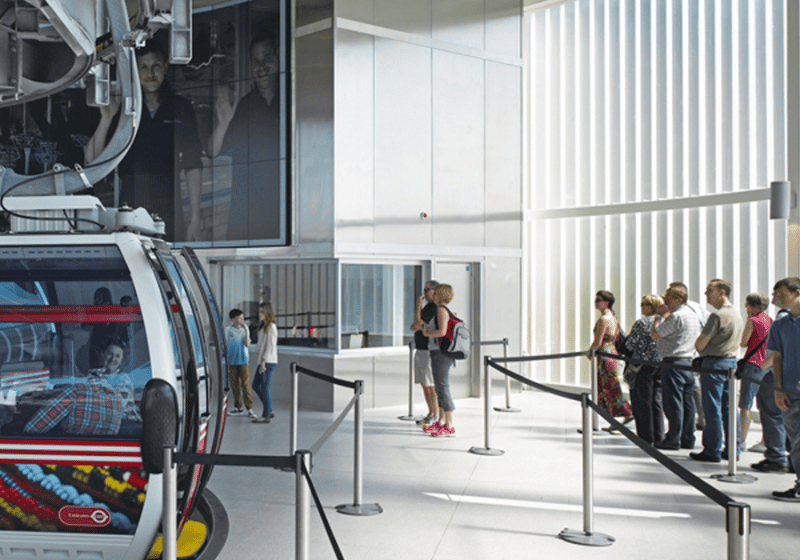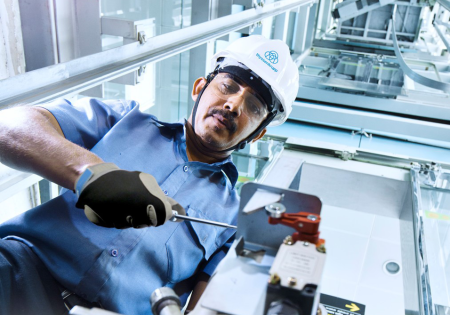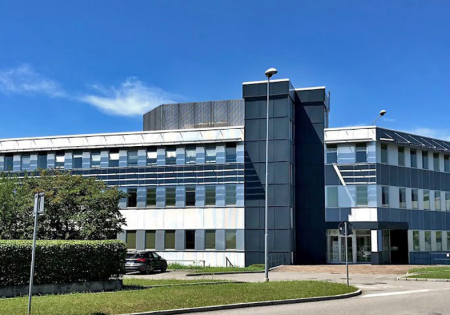Katsuhiko Sato (KS), managing director, Toshiba Johnson Elevators India Pvt. Ltd. (TJEI), shared his thoughts on his company and its place in the Indian VT industry with your author (YP).
YP: How would you describe TJEI’s vision and strategy for the Indian vertical-transportation (VT) market?
KS: Rapid industrialization, modernization and urbanization have accelerated India as the fifth-largest economy in the world, with a gross domestic product of US$2.9 trillion. It is projected that by the end of 2050, more than 53% of India’s population will live in urban spaces.
In India, Toshiba has been involved in the development of significant infrastructure facilities.
To cater to the growing population of urban dwellers, Toshiba entered the Indian elevator market in fiscal year (FY) 2011 with a product lineup offering high-speed elevators for skyscrapers and premium markets. As a result of aggressive penetration in the Indian market, TJEI achieved a 3,800-units booking milestone by FY 2019. In the past seven years, the company registered a year-over-year compound annual growth rate of more than 15%. It also aims to achieve top market share in its targeted segment by achieving an annual booking target of 2,000 units per year by FY 2025.
YP: Which qualities or aspects set TJEI and its offerings apart? How would you define its unique selling proposition?
KS:Toshiba has harnessed technological innovations developed over its 140 years to provide solutions for high-speed, safe and reliable elevators. For many years, Toshiba Elevator and Building Systems Corp. (TELC) held an entry in the Guinness World Records for installing the fastest elevator in the world, at Taipei 101 in Taiwan. Recently it was honored with a Gold award at the iF Design awards (see sidebar) for its destination-control system FLOORNAVI. We have earned a zero-accident record in India by conducting a rigorous “7-Step Quality Check” of every installation. Furthermore, sustainability being the top priority of the company, many features that save power are now standardized in TJEI’s elevators.
YP: What is the significance of TJEI in the overall operations of Toshiba India and TELC?
KS:Toshiba restructured its complete business to expand and ensure sustained growth. In India, Toshiba has been involved in the development of significant infrastructure facilities. Toshiba elevator and escalator products play a key role in overall Indian operations. Toshiba has been instrumental in building quality infrastructure in Japan, and we are now supporting India to construct the social infrastructure for sustainable urban development. Using the same Japanese technology and years of expertise, Toshiba is committed to collaborating with India.
To meet the volumes offered by the Indian market, we are offering a wide range of products, including elevators “made for India,” which cater to the premium, as well as upper-middle segments of the market.
YP: What are your expectations for 2021 and beyond in the VT sector in India?
KS:India is the second-largest country in the world in terms of annual demand for elevators and escalators. The VT sector is expected to grow at a compound annual growth rate of 8% year over year. Unfortunately, we are in the midst of an unprecedented crisis brought on by COVID-19, but India still has a strong and concrete demand for the residential market. We are positive that the Indian market will bounce back from the current slowdown sooner, rather than later. To meet the volumes offered by the Indian market, we are offering a wide range of products, including elevators “made for India,” which cater to the premium, as well as upper-middle segments of the market.
YP: Which real estate and infrastructure segments do you see being the key demand drivers for VT going forward? Which types of elevators and escalators do you expect to witness a demand for and why?
KS: India’s unprecedented urban population growth is creating greater demand for both residential and commercial spaces that has put the elevator business in India on a high-growth trajectory. In fact, India is the second-fastest-growing market for elevators. The market is expected to grow further, and TJEI is well-placed to meet this increased demand by manufacturing products that meet the unique and distinguished preferences of India, like the ELCOSMO-III-S, a series of elevators made for India.
YP: Taking RERA and its norms into consideration, do you see greater scope for TJEI to partner with developers/real estate associations for large projects?
KS: RERA ensures transparency in the real estate industry. Clearer norms have been improving the business environment and conditions for both suppliers and consumers. With clear timeline stipulations and strong financial credibility ensured, elevator companies can plan their resources meticulously and lay more tangible budgets. TJEI is already associated/partnered with many real estate companies for several of their projects. With RERA, we will be further strengthening and consolidating our partnership with them and expand our horizons with new ones.
YP: How does TJEI focus on safety and maintenance aspects? Is there an emphasis on leveraging technology for greater safety for end users and training sessions for the in-house maintenance team?
KS: TJEI established its training facility in India last year exclusively for installation and maintenance team members. Several rigorous training modules have been designed to train new employees, as well as experienced members. Frequent refresher training sessions are organized based on the experience level of every technician to ensure and maintain our zero-accident history. All incidents or near-misses that might have taken place (globally) are shared with the technicians, and suitable learnings/inferences are drawn for them to be future-ready.
YP: Do you feel there is a need for enforcing a uniform act regulating VT across India, especially for ensuring safety and maintenance?
KS: There are more than 400 elevator suppliers in India, and we have the Bureau of Indian Standards (BIS), as well as state-based acts, regulating VT; however, the key concern is implementation and governance. In my opinion, considering the volume of suppliers, implementation and governance of these acts must be strengthened to ensure zero accidents in elevators. We come across many accidents inside elevators, elevator shafts and construction side hoists causing loss of life. This has to stop. Strict governance with a uniform regulatory act is the need of the hour in India.
YP: How has the importance of preventive and remote maintenance increased due to the COVID-19 situation?
KS: Preventive and proactive maintenance have always been integral parts of our products and services. Our maintenance services are available 24/7 across India. High-quality maintenance is of paramount importance; therefore, we have developed a Remote Maintenance System (RMS) to offer seamless and real-time maintenance services to all our clients.
Even during the peak of the pandemic, our employees followed all safety guidelines and were always in the field to ensure maximum uptime of our elevators. In the near future, we plan to connect all our existing and newly contracted elevators to our newly developed RMS, which will ensure the good health of our elevators and 100% safety for our users.
YP: Why is it important for the end users, such as housing societies that take over residential buildings, to continue having their elevators maintained by the OEM that provided them, instead of switching to cheaper options from local service providers?
KS: It has been proven on several occasions that most accidents involve elevators being maintained by non-OEM, local service providers. Lack of experience and the use of non-genuine spares are major causes of such accidents. As an OEM, we would like to urge elevator users to realize the importance of services provided by a genuine OEM. Long-term benefits must not be ignored on account of short-term gains. We are dealing with human lives, and a safe passage is ensured when OEMs provide routine and preventive maintenance. When it comes to human safety, nothing can be left to chance. Hence, we strongly urge elevator users to ensure that their equipment is maintained by the OEM. After all, what good is the money saved compared to the lives that are almost always at risk in poorly serviced elevators?
We at Toshiba have all of our elevators (Pan-India) serviced by well-qualified and -trained team members, and use only genuine spare parts. We have large warehouses in all metro cities and satellite warehouses in Tier-2 and -3 cities. Our maintenance services are available on a 24/7/365 basis via a toll-free number.
The iF Design Award
The iF Design Award is presented by the nonprofit iF Design Foundation of Hanover, Germany. Toshiba’s FLOORNAVI was one of 75 submissions, out of 7,298 worldwide, to receive the award. In recognizing FLOORNAVI, the awards jury said:
“Toshiba has designed an efficient elevator [destination] control system in line with universal design to cater to the needs of able and disabled people. [AI] allows floor destinations to be bundled effectively, reducing waiting time. The simple and easy interface is readily adaptable to various architecture contexts.”
About Katsuhiko Sato
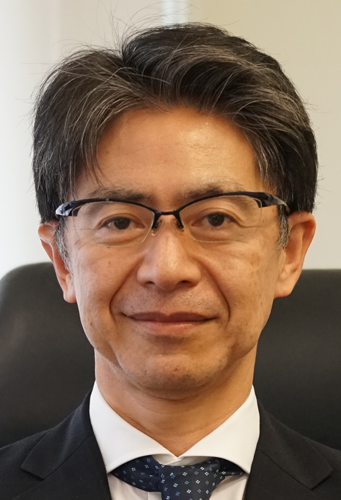
A graduate of Japan’s prestigious Meiji University, Katsuhiko Sato joined Toshiba in 1993. He started his career in the sales department of the elevator and escalator division, responsible for all enquiries and requirements of the central government. After working in and heading the domestic sales department for more than 20 years, Sato was promoted to spearhead overseas sales and marketing as senior manager. With his experience and understanding of the elevator industry, he supported Toshiba Johnson Elevators India Pvt. Ltd. (TJEI) from Tokyo for more than three years. In February, Sato was promoted to managing director of TJEI, tasked with overseeing the company’s responsibilities and elevating its growth track in India.
TJEI, a joint venture of Toshiba Elevator and Building Systems Corp. and Johnson Lifts Pvt. Ltd., provides energy-efficient, safe vertical-transportation systems for the India market utilizing the comprehensive technological infrastructure developed over Toshiba’s more-than 140 years of history.
Get more of Elevator World. Sign up for our free e-newsletter.

